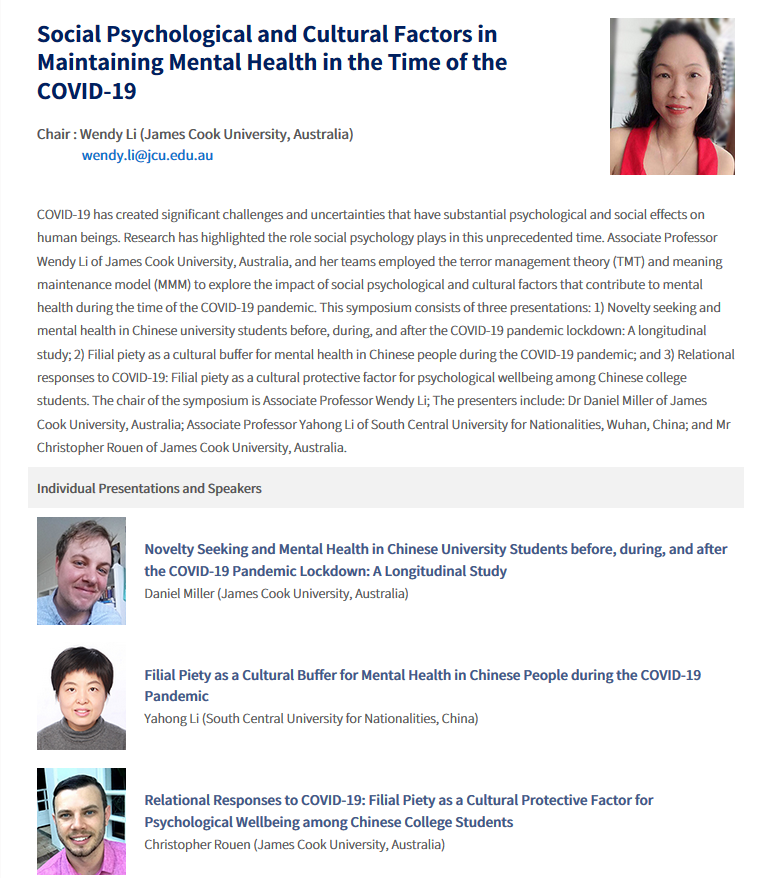14th Asian Association Social Psychology Biennial Conference
Featured symposium for the 14th Asian Association Social Psychology Biennial Conference
Our team:
- A/Prof Wendy Li
- Dr Daniel Miller
- A/Prof Yahong Li
- Mr Christopher Rouen
Invited by the 14th AASP Biennial Conference, co-organized by the Asian Association of Social Psychology (AASP) and the Korean Social and Personality Psychological Association (KSPPA), an AMHRG team present a featured symposium entitled “Social Psychological and Cultural Factors in Maintaining Mental Health in the Time of the COVID-19”. (https://www.aasp2021seoul.org/html/?pmode=Scientificprogram)
COVID-19 has created significant challenges and uncertainties that have substantial psychological and social effects on human beings. Research has highlighted the role social psychology plays in this unprecedented time. Associate Professor Wendy Li of James Cook University, Australia, and her teams employed the terror management theory (TMT) and meaning maintenance model (MMM) to explore the impact of social psychological and cultural factors that contribute to mental health during the time of the COVID-19 pandemic. This symposium consists of three presentations: 1) Novelty seeking and mental health in Chinese university students before, during, and after the COVID-19 pandemic lockdown: A longitudinal study; 2) Filial piety as a cultural buffer for mental health in Chinese people during the COVID-19 pandemic; and 3) Relational responses to COVID-19: Filial piety as a cultural protective factor for psychological wellbeing among Chinese college students. The chair of the symposium is Associate Professor Wendy Li; The presenters include: Dr Daniel Miller of James Cook University, Australia; Associate Professor Yahong Li of South Central University for Nationalities, Wuhan, China; and Mr Christopher Rouen of James Cook University, Australia.
Individual presentations
Novelty seeking and mental health in Chinese university students before, during, and after the COVID-19 pandemic lockdown: A longitudinal study
Presenter: Dr Daniel Miller, James Cook University, Australia
This longitudinal study explored the relationship between novelty seeking and mental health in Chinese university students before, during, and after the COVID-19 pandemic lockdown. Participants were surveyed at three points: November, 2019 (prior to the COVID-19 pandemic); between February and March, 2020 (during the peak of the pandemic and intense lockdown in China); and between May and June, 2020 (after lockdown had been lifted in China). Cross-sectionally, correlation analysis indicated that greater novelty seeking was associated with lower levels of stress, anxiety, and depression at all three time points. Univariate latent curve modelling (LCM) indicated a growth trajectory where novelty seeking increased over time and then remained high during the post-lockdown period. Stress, anxiety, and depression all showed V-shaped growth trajectories where these variables decreased during lockdown, before increasing in the post-lockdown period. Multivariate LCM indicated the growth trajectory for novelty seeking was associated with the growth trajectories for stress, anxiety, and depression. This suggests that the observed decreases in stress, anxiety, and depression during the lockdown period may attribute to the sample’s observed increase in novelty seeking. These findings are valuable in that they challenge the notion that lockdown measures are inherently detrimental to mental health. The findings indicate the important role of novelty seeking in responding to crises. It may be possible for future public health measures to incorporate the promotion of novelty seeking to help individuals’ respond to stressful situations and maintain good mental health in the face of crises. To access the article, please visit: https://doi.org/10.3389/fpsyg.2020.600739
Filial piety as a cultural buffer for mental health in Chinese people during the COVID-19 pandemic
Presenter: A/Prof Yahong Li, South Central University for Nationalities, Wuhan, China
This study investigated the mental health of Chinese people during the COVID-19 outbreak who lived in areas with differing levels of infection severity and assessed the association between filial piety and mental health in times of crisis. Statistics provided by National Health Commission of China, regarding cases and deaths per region, were used to categorize Wuhan City, Hubei Province outside Wuhan, and elsewhere in China into high, moderate, and low infection severity areas. A sample of 1,202 Chinese participants were surveyed between April and June 2020. There were 282 from the high infection severity area (23.5%), 162 from the moderate area (13.4%) and 758 from the low area (63.1%). Utilising the Depression Anxiety Stress Scale severity categories, the highest infection severity group had a higher percentage of participants categorised as having moderate to extremely severe levels of stress, anxiety and depression, as compared to the moderate and low infection severity. General linear modelling indicated that, after adjusting for group differences in age, gender, and education, the high infection severity group displayed higher levels of stress, anxiety and depression than the low infection severity groups. The models also found reciprocal filial piety to have a negative association with depression, anxiety, and stress. However, authoritarian filial piety was unrelated to all three outcome variables. The findings indicate the important role of reciprocal filial piety in responding to the COVID-19 crisis.
Relational responses to COVID-19: Filial piety as a cultural protective factor for psychological wellbeing among Chinese college students
Presenter: Christopher Rouen, James Cook University, Australia
Through two rounds of semi-structured interviews of 63 participants, this study investigated the psychological wellbeing and related cultural factors of a cohort of Chinese college students during the government imposed mass quarantine implemented in response to the outbreak of COVID-19. Although much of the extant of COVID-19 research suggests that, in general, quarantine measures have negative ramifications for psychological wellbeing, the majority of participants in this study reported an improvement in their psychological wellbeing during quarantine compared to before the COVID-19 pandemic. These participants reported better sleep, less academic stress, closer relationships with their parents and increased creativity. Within the context of the Meaning Maintenance Model, the cultural resource of filial piety was identified as a contributor to psychological wellbeing improvement. Furthermore, this study demonstrated that human beings are not simply passive recipients of crisis situations, but are instead active meaning makers and intentional agents, who can reconstruct and reaffirm relational meaning when faced with a crisis so as to maintain psychological wellbeing.
